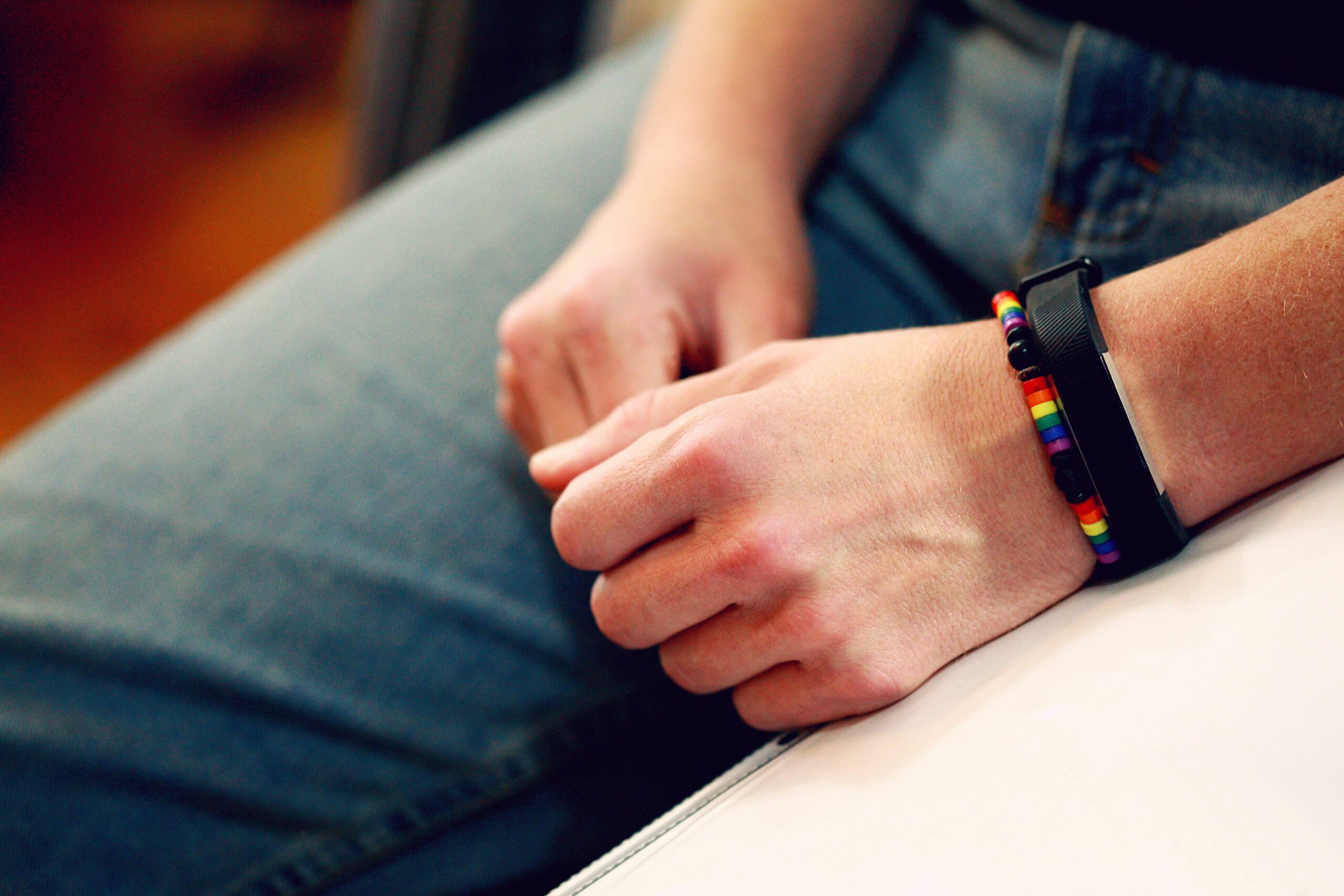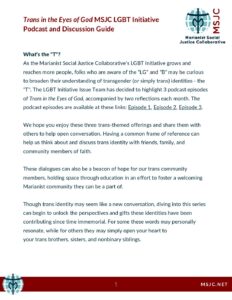In her novel Beloved, Toni Morrison writes:
Love your hands! Love them. Raise them up and kiss them. Touch others with them, pat them together, stroke them on your face …You got to love it, you! … This is flesh I’m talking about here. Flesh that needs to be loved.
But such love is a hard grace: flesh that is love; love embodied. So we must proceed with reverence in what we say, for it is “flesh we are talking about here,” the most intimate aspect of our lives.
In the 2017 document “Created Male and Female: An Open Letter from Religious Leaders,” published by the United States Conference of Catholic Bishops, several prominent bishops joined other religious leaders in opposing what they regarded as a “gender ideology” upholding “the false idea—that a man can be or become a woman or vice versa.”
While insisting that “the socio-cultural reality of gender cannot be separated from one’s sex as male or female,” the authors acknowledge that gender dysphoria “is a complicated reality that needs to be addressed with sensitivity and truth.”
It is in that spirit of sensitivity and truth that I offer this response, drawing upon a largely untapped resource in our church’s teaching on sexuality—the rich heritage of Catholic social teaching.
The primacy of dignity
As the authors of the open letter note, “all human beings are created by God and hereby have an inherent dignity.” The dignity of moral persons is a motif running throughout the history of Catholic moral theology. For St. Thomas Aquinas, we bear the “image of God” as moral agents participating in God’s loving care for creation. Natural law is our imperfect participation in God’s eternal law. Only in the modern period, however, does human dignity emerge as the key hermeneutical principle for the church’s public theology—a leitmotif in the church’s social teaching.
In the wake of the Shoah, the Hebrew name for the Holocaust, Pope St. John XXIII’s 1963 encyclical Pacem in terris adopts the discourse of dignity as the ground of equal human rights. “[F]aith in fundamental human rights, in the dignity and worth of the human person and in the equal rights of men and women,” affirmed in the Universal Declaration of Human Rights, is embraced—and two years later, the doctrine of religious liberty fully recognized.
“The equal dignity of persons, guaranteed in a regime of equal basic human rights and correlative duties, becomes the decisive normative principle.”
We see in these moves a significant hermeneutical or interpretative shift. In Scholastic and neo-Scholastic teaching, dignity was interpreted within the context of a rich, metaphysical hierarchy, defining the telos or end of the common good leading ultimately to salvation (and eo ipso, incorporation in the Roman Catholic Church).
The “perfect community” comprised a multi-status hierarchy of roles and rights determined, in part, by sexual differentiation. Women, for Aquinas, were in a “natural state of subjection,” incapable, in general, of exercising full public virtue.
Now it is the reversal of this hermeneutical flow that marks the church in our modern world. Henceforth, the equal dignity of persons, guaranteed in a regime of equal basic human rights and correlative duties, becomes the decisive normative principle. Dignity signifies that persons, as persons, are irreducibly valuable, possessed of intrinsic and absolute worth (whatever their full conception of the good or perfection might be).
The dignity of persons obtains independently of properties distinguishing them (e.g., race, ethnicity or gender), and is “given” prior to any legislative enactment or judicial decision. As the philosopher Immanuel Kant reminds us, persons have worth, not price.
Ethical implications
The implications of dignity are rich and complex for our understanding of sexuality, and I can only touch upon them here.
First, the church’s interventions in the political order are no longer governed by a perfectionist teleology, ordered to a single metaphysical common good, much less the finality of the sexual act.
Rather, as Pope St. John XXIII argues, the common good today will be realized in modern pluralist societies like our own, in establishing a basic rights regime preserving the dignity of all, including their rights of effective participation in the public order. No longer can distinctive religious beliefs be imposed under the banner of establishment.
One implication of this hermeneutical shift is that respect for persons’ dignity and equal rights raises serious questions about legislative or judicial discrimination on the basis of sex or gender. Dignity is not “heteronormative.” To say so would be a category mistake.
The modern primacy of dignity does not preclude our distinctive religious beliefs, nor need we bracket them, even in public discourse. It is, after all, religious belief that for many undergirds their recognition of dignity (e.g., their appeal to the Imago Dei). But religious appeals to classical teleology, like hierarchical role-differentiation or gender complementarity, must be rendered consistent with the primacy accorded equal dignity. Pope St. John Paul II, for instance, rejects the Scholastic belief that women are in a state of natural subjection.
The primacy of dignity, moreover, raises into question a sharp binary distinction of natural kinds: male and female, and the corollary binary opposition of nature (sexed) and culture (gendered). Dignity is proper to persons as embodied moral agents where embodiment signifies the complex, personal integration of biology, environment and culture.
The pertinent distinction here is not nature as “given” and culture as “constructed,” but rather embodiment and freedom. We may, indeed, speak of a hermeneutics of embodiment ranging over a child’s assigned (or natal) gender to mature gender identity. Such a gambit, I believe, avoids the twin extremes of an uncritical naturalism, where biological anatomy exhausts gender, or an equally uncritical voluntarism, where gender is reduced to mere preference, leading, in Pope Benedict XVI’s words, to “the ‘trivialization’ of sexual specificity.”
Rather, freedom is embodied, and we must ask how just embodiment configures choice. I think the key word here is ask. To acknowledge the biological endowment of sex as, in Pope Benedict XVI’s words, “a determined characteristic” is morally relevant, but not necessarily decisive.
As Stephen Rosenthal, an expert on pediatric endocrinology, observes: “Compelling studies have demonstrated that gender identity is not simply a psychosocial construct, but likely reflects a complex interplay of biologic, environmental, and cultural factors.”
In looking ahead, we might even look back and take some instruction from Aquinas. For while his 13th-century biology is primitive by our standards, his sexual morality is not entirely “physicalist,” as some critics would contend.
Aquinas does not simply infer precepts of natural law from the structure of the sexual act. Rather, he looks to the characteristic “inclination” of procreation and rearing shared by persons and animals alike. For him, what was “given” in the inclination to procreation was a clear, unproblematic demarcation of male and female. But today, our view is necessarily more complex: we recognize that “nature” does not speak unequivocally, but, as we argued, in the complex process of embodiment.
“Before God, the choice of bodily integrity is just what nature requires. Here, we ‘image’ God. Our transgender sisters and brothers do no less.”
“Gender identity,” writes Rosenthal, “can only be assumed, and not, in fact, known until an individual achieves a particular level of psychological development and self-awareness.” In a sense, what nature “gives” us is a task: Integral embodiment in freedom, and not simply a recipe.
Gender dysphoria, the incongruence between experienced gender and assigned (natal) gender, then appears as a matter of clinical, ethical and pastoral concern. We still have much to learn, especially regarding appropriate clinical care for gender dysphoric pre-pubertal youth.
But the ethical and pastoral concerns remain exigent: Transgender youth have a two to threefold increased risk of anxiety, depression and suicidal ideation compared to their peers.
And it is here we must begin, as Pope Francis reminds us, for the common good entails a preferential option for those most vulnerable—whose equal dignity is unequally threatened by bias or stigmatization.
Conclusions
Neither clinical nor ethical and pastoral care for gender dysphoric youth imply the so-called “gender ideology” (or “transgenderism”) decried by some church authorities. Rather, as I have argued, embodied freedom offers a via media between reductive assimilations of sex to gender (“gender ideology”) or gender to sex (physicalism). For the great theologian Karl Rahner, S.J., what distinguishes us as persons—indeed, what constitutes our very nature as persons—is just this embodied freedom.
Before God, the choice of bodily integrity is just what nature requires. Here, we “image” God. Our transgender sisters and brothers do no less. As the authors of the 2017 bishops’ letter remind us, “what God has created is good,” and it is this goodness we must defend against all “ridicule, marginalization and other forms of retaliation.”
Let us then, as Pope Francis admonishes us, look to the wisdom of mercy. For it is flesh we are talking about here: flesh that needs to be loved.




